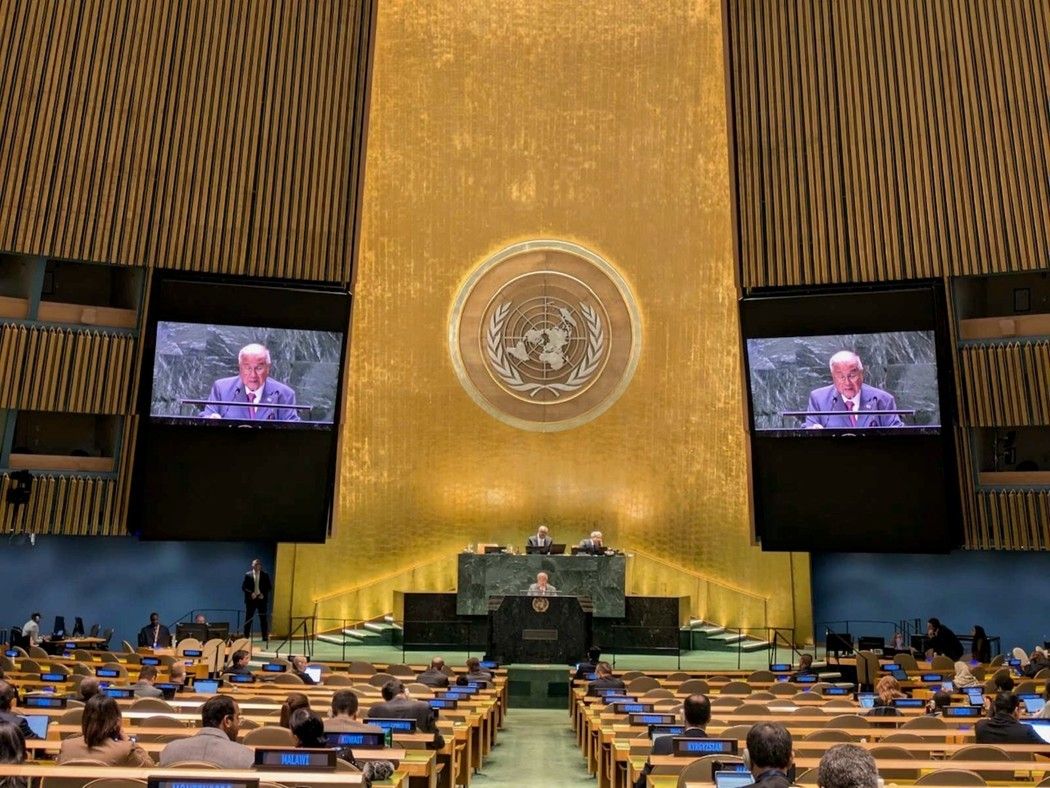Philippines rebukes China's claims over Scarborough Shoal at UN

MANILA, Philippines — The Philippines stood before the United Nations on Tuesday, December 10 to assert its sovereign rights over Scarborough Shoal (Bajo de Masinloc), a coral reef formation within the country's exclusive economic zone where China announced territorial sea baselines last month.
Speaking before world leaders and country delegates at the UN General Assembly, Philippine Permanent Representative Antonio Lagdameo defended the Philippines' sovereign rights over the disputed feature and rejected Beijing's recent move to draw boundaries around it.
Lagdameo's speech comes days after China's Permanent Representative to the UN said it "deposited" charts of its baselines around Scarborough Shoal to the UN, and around a month after China publicized coordinates claiming the feature. The Philippines' maritime council had called the move "without any legal basis or effect."
Lagdameo delivered his statement during the UN General Assembly's annual debate on oceans and maritime law, where member states discuss developments in UNCLOS and other ocean-related matters.
"China's response of announcing baselines around Bajo de Masinloc... is a violation of UNCLOS and undermines the rules-based international order," Lagdameo told the assembly.
"Bajo de Masinloc has always been an integral part of the territory of the Philippines," he said.
In his address, Lagdameo emphasized that the Philippines has the exclusive right to establish baselines and determine the breadth of territorial waters around Scarborough Shoal, which is located 124 nautical miles west of Zambales.
A UN tribunal in 2016 ruled that Beijing's claims to nearly all of the South China Sea were contrary to UNCLOS and had no basis in international law. The Philippines filed the arbitration case in 2013, a year after China seized control of Scarborough Shoal following a tense standoff with Philippine vessels.
Beijing has refused to recognize the ruling and has instead continued to prevent Filipinos from fishing in the area.
China's constant incursions into the Philippines' EEZ prompted lawmakers to craft two new maritime laws that aimed to strengthen the Philippines' maritime sovereignty and position. The two laws, the Maritime Zones Act and the Archipelagic Sea Lanes Act, were signed into law in November, angering China.
Lagdameo said the new laws aligned domestic laws with UNCLOS and reinforced the 2016 arbitral ruling — the "foundation" of the Philippines' policy on the South China Sea.
"With these, we reinforce the alignment of our domestic laws with UNCLOS, improve our capacity for ocean governance, and enhance our maritime policies for economic development and for national security," he said.
Lagdameo reiterated Manila's commitment to peaceful dispute resolution. "Despite irresponsible and dangerous actions against our legitimate activities within our maritime zones, including our exclusive economic zone, the Philippines remains committed to diplomacy and other peaceful means to settle disputes," he said.
The Philippine ambassador also rejected attempts to frame the South China Sea dispute as a great power competition. "We reject narratives depicting the South China Sea as a theater of major power rivalry," he said, "because they ignore a fundamental truth. All states, as sovereigns, have the right to determine their own destiny."
Beyond territorial concerns, Lagdameo highlighted what he called an "ocean emergency" facing the Philippines, an archipelagic nation of over 7,000 islands.
The Philippines faces "unprecedented levels of ocean temperatures, frequent storms, degraded coastal ecosystems, and sea level rise," Lagdameo said. He added that coastal states and small island states face increasing threats from marine plastic pollution.
Lagdameo welcomed the International Tribunal for the Law of the Sea's first advisory opinion on states' obligations regarding climate change, noting its emphasis on collective duty under UNCLOS to protect the marine environment.
- Latest
- Trending

































